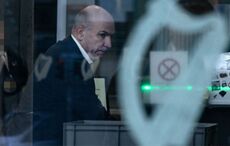How do you look someone in the eye and admit you sent their loved ones into war for ill-considered reasons?
How do you tell them that their sons and daughters, husbands and wives died in vain for a conflict built on lies?
The answer is you don't, because no one could, even after the publication of the damning seven year, 2.6 million word Iraq War report by Sir John Chilcot and his committee released this week.
Chilcot, a pillar of the British establishment, had total access to secret documents including private communications between Prime Minister Tony Blair and President George W Bush, which under normal circumstances would not be released this year, or possibly ever.
In the run up to war Blair had made Saddam Hussein's alleged possession of weapons of mass destruction (WMD) his central justification for the invasion of Iraq, but those weapons of mass destruction simply did not exist.
The truth, confirmed now but at the time widely suspected, is that Bush administration intelligence about WMD was almost entirely wrong and much of it was utter fiction.
The new report claims that Blair was at times even less briefed about the real situation on the ground in Iraq than operatives at MI6, who were briefing him and who understood just how flimsy much of the intelligence on Iraq really was.
The invasion and the mayhem that quickly followed was due to poor intelligence and the failure to secure the peace after the invasion.
The false intelligence that justified and guided the Iraq war is now considered the worst failure in the history of the UK and the US's intelligence services.
One hundred and seventy-nine British servicemen and servicewomen lost their lives in Iraq, and three were from Ireland.
Lance Corporal Ian Malone, 28, came from Ballyfermot in Dublin; Captain Ken Masters, 40, came from Portadown, County Armagh and Lance Corporal Timothy Flowers, 28, came from Derry.
Lance Corporal Malone served in the 1st Battalion of the Irish Guards. He was reportedly killed by sniper fire during fighting in Basra in March 2003.
Lance Corporal Flowers served with the Royal Electrical and Mechanical Engineers and reportedly died after a mortar attack hit the British army’s Basra Palace base in July 2007.
Captain Ken Masters, a father of two girls, served with the Royal Military Police and took his own life in Basra in October 2005.
Lance Corporal Malone’s funeral was held at the Church of the Assumption in Ballyfermot in Dublin. The following St Patrick’s Day May Malone, the soldier's mother, used a visit to the Irish Guards regiment in south Armagh to passionately condemn the war.
“I don’t think the war should ever have happened. It was not necessary. There was no need for the war at all,” she said. “Since the war has ended so many have died, I think it was totally unnecessary. I was fairly bitter, but you cannot go through life being bitter because Ian wouldn’t have wanted that – my son was a proud man and very proud to be in the Irish Guards so for his sake I try not to be bitter.”
Captain Master's wife Alison told the press his life could have been saved if had he been helped to cope with the great stress of the conflict.
“We are asking far too much of our troops, they are working 24/7 without any help. They are overstretched and attitudes need to be changed,” Masters told the BBC. “Depression is an illness, but they really need to look at the stress and having somebody out there to look after them,” she said.
Ms Masters added that her husband’s colleagues in Iraq had noticed he was not well, but “nothing was done for him.”
Lance Corporal Flowers, a mechanic, died when his base was struck by a suspected mortar or rocket. From the Waterside area of Derry, he was buried with full military honors in Portstewart, County Derry where he had lived with his grandparents.
The Chilcot inquiry concluded this week that that the circumstances in which the Blair government decided that there was a legal basis for military action were “far from satisfactory.” That claim leaves the door open, some critics say, to a potential criminal prosecution.




Comments